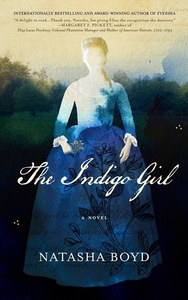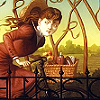Take a photo of a barcode or cover
I wanted to like this book but reading it reminded me of the movie Gone With The Wind. The author seemed to romanticize a bygone era by making her slaves a team of "we" and "us" fighting for the greater good.
I do give the author credit for exposing me to, Eliza Lucas.
I do give the author credit for exposing me to, Eliza Lucas.
You can tell this author is primarily a romance writer dipping her toes in historical fiction. This is actually based on a true story but it reads less historical and more romantic. Yet, it is not a total loss, I learned about the rise of the indigo crop and how important Eliza Lucas was in the building of South Carolina's agriculture. And once again, I became frustrated with history's oppression of women. As usual, Eliza is looked down upon and only valued as a domestic, even though she would be a CEO of a Fortune 500 company in modern times. Thankfully, she prevailed and is recognized for her true worth.
Indigo Girl by Natasha Boyd is a historical fiction novel based on the story of Eliza Lucas.
Eliza is a young woman living in the ~1730s and her story of becoming a successful indigo farmer in a time women were not afforded opportunities to contribute and advance society in a non-traditional capacity.
Eliza was left by her father to further his military career, while Eliza was expected to provide for her mother and younger sister and manage the family’s plantation. Eliza a woman ahead of her time seizes the opportunity to innovate the plantation to improve its success and profitability. However, this is not without barriers and hardships.
Initially a slow start, but becomes captivating as the readers connects and invests in Eliza. An interesting read from a time period we are less oriented to in history.
Eliza is a young woman living in the ~1730s and her story of becoming a successful indigo farmer in a time women were not afforded opportunities to contribute and advance society in a non-traditional capacity.
Eliza was left by her father to further his military career, while Eliza was expected to provide for her mother and younger sister and manage the family’s plantation. Eliza a woman ahead of her time seizes the opportunity to innovate the plantation to improve its success and profitability. However, this is not without barriers and hardships.
Initially a slow start, but becomes captivating as the readers connects and invests in Eliza. An interesting read from a time period we are less oriented to in history.
adventurous
hopeful
informative
inspiring
medium-paced
Plot or Character Driven:
A mix
Strong character development:
Yes
Loveable characters:
Yes
Diverse cast of characters:
Complicated
Flaws of characters a main focus:
N/A
adventurous
informative
inspiring
medium-paced
adventurous
challenging
informative
inspiring
Plot or Character Driven:
A mix
Diverse cast of characters:
Yes
Flaws of characters a main focus:
Yes
This book had some flaws, but the simple fact is that it's about a woman largely forgotten to history when she shouldn't be, and when she did so much for a fledgling America. And it's a super interesting look at plantation life pre-Civil War and since it's all based in fact, that really makes ya wonder about a lot of what we've been fed over the years and how many plantation owners were more like Eliza Lucas's father.
Lots of food for thought, and a heroine worth learning about.
Lots of food for thought, and a heroine worth learning about.
Like so many who have taken up The Indigo Girl, I had no idea who Eliza Lucas was before I did so. Still, what the summary told me left me very intrigued, and so I firmly kept it on my to-read list and had it wait its turn.
In the end, I liked Eliza's story very much. The idea that she began as a young girl left to run her family's plantations on her behalf of her absent father and younger brother, struggling to be taken seriously in what was considered a solely male province, and grew to be considered such an amazing badass that the very first President of the United States, George Washington himself, well and truly asked to be a pallbearer at her funeral, was an absolutely fascinating one. I enjoyed her drive, her determination, and found the obstacles that she faced all too familiar. I lost count of how many times someone called Eliza "too ambitious", and that comment in particular struck home, because it is a line that is still trotted out even today when a woman is considered too forward - a most recent example when a few misogynist jerks threw that phrase at then-Senator Kamala Harris when she was under consideration to become Joe Biden's running mate. Much has changed between Eliza's time and now, but not everything.
I spent much of the book incensed by Eliza's mother's behavior, deliberately acting to sabotage her daughter's efforts just so she can return to Antigua for her own comfort, among other things. Most particularly in trying to foist a match with Cromwell on Eliza. I shuddered more than once, and spent a good part of the book fearing I was going to be subjected to an explicit rape scene in the name of "shock value" and "realism". Thankfully, though, Boyd spared me that.
The also enjoyed the stories of the enslaved people who served Eliza and her family. Quash, Togo, Essie, Sarah, and all the others had such unique voices and personalities, something I was glad to see Boyd take time to do as she wrote the book. Quash in particular was one of my favorites, and I was shocked to learn that the part about him getting caught up in a slave rebellion was actually true. The book portrays the incident as Eliza speaking on his behalf and saving him (which kind of made me uncomfortable a bit with the allusion to the whole White Savior trope), but I've read some historical research that suggests that Quash may have actually defended himself, albeit with Eliza's supportive presence, as she was an eyewitness to Quash's trial and is the source of much of our information about what happened then.
I've noticed in a lot of other reviews that opinion seems to be divided upon the subject of Ben. Personally, I rather enjoyed the character, and found his end terribly tragic, particularly with the twist that Sarah may have inadvertently cursed him in her anger against Eliza. Boyd's description of how she came to create the character, building upon the vague mentions of a possible black indigo maker being sent from the West Indies by Eliza's father and Eliza defending her friendship with "someone", was very interesting.
Overall, this was an enjoyable read. Saskia Maarleveld was an excellent narrator as well. It's definitely set me on to looking for actual biographies about Eliza.
In the end, I liked Eliza's story very much. The idea that she began as a young girl left to run her family's plantations on her behalf of her absent father and younger brother, struggling to be taken seriously in what was considered a solely male province, and grew to be considered such an amazing badass that the very first President of the United States, George Washington himself, well and truly asked to be a pallbearer at her funeral, was an absolutely fascinating one. I enjoyed her drive, her determination, and found the obstacles that she faced all too familiar. I lost count of how many times someone called Eliza "too ambitious", and that comment in particular struck home, because it is a line that is still trotted out even today when a woman is considered too forward - a most recent example when a few misogynist jerks threw that phrase at then-Senator Kamala Harris when she was under consideration to become Joe Biden's running mate. Much has changed between Eliza's time and now, but not everything.
I spent much of the book incensed by Eliza's mother's behavior, deliberately acting to sabotage her daughter's efforts just so she can return to Antigua for her own comfort, among other things. Most particularly in trying to foist a match with Cromwell on Eliza. I shuddered more than once, and spent a good part of the book fearing I was going to be subjected to an explicit rape scene in the name of "shock value" and "realism". Thankfully, though, Boyd spared me that.
The also enjoyed the stories of the enslaved people who served Eliza and her family. Quash, Togo, Essie, Sarah, and all the others had such unique voices and personalities, something I was glad to see Boyd take time to do as she wrote the book. Quash in particular was one of my favorites, and I was shocked to learn that the part about him getting caught up in a slave rebellion was actually true. The book portrays the incident as Eliza speaking on his behalf and saving him (which kind of made me uncomfortable a bit with the allusion to the whole White Savior trope), but I've read some historical research that suggests that Quash may have actually defended himself, albeit with Eliza's supportive presence, as she was an eyewitness to Quash's trial and is the source of much of our information about what happened then.
I've noticed in a lot of other reviews that opinion seems to be divided upon the subject of Ben. Personally, I rather enjoyed the character, and found his end terribly tragic, particularly with the twist that Sarah may have inadvertently cursed him in her anger against Eliza. Boyd's description of how she came to create the character, building upon the vague mentions of a possible black indigo maker being sent from the West Indies by Eliza's father and Eliza defending her friendship with "someone", was very interesting.
Overall, this was an enjoyable read. Saskia Maarleveld was an excellent narrator as well. It's definitely set me on to looking for actual biographies about Eliza.
Loved this story, based on true events, of a very strong, resilient, and courageous South Carolinian woman!
I really wanted to love this, but it fell short for me. I wanted to discover that our MC was actually experimenting with the indigo process, having breakthroughs of her own, but she literally just relied on the slaves for every step the entire process.
She was definitely groundbreaking for this time - a commendable woman and entrepreneur, and her compassion was real, and at one point was a true badass. I guess I just hoped for a bit of 1700s STEM.
Part of my disappointment may have been buildup. I’ve been wanting to read The Indigo Girl for months on end. I may have just built it up too much for myself.
She was definitely groundbreaking for this time - a commendable woman and entrepreneur, and her compassion was real, and at one point was a true badass. I guess I just hoped for a bit of 1700s STEM.
Part of my disappointment may have been buildup. I’ve been wanting to read The Indigo Girl for months on end. I may have just built it up too much for myself.
i really enjoyed this book. I love South Carolina and to find out this is based on fact made it even better.








